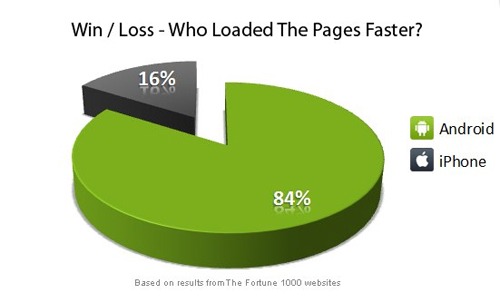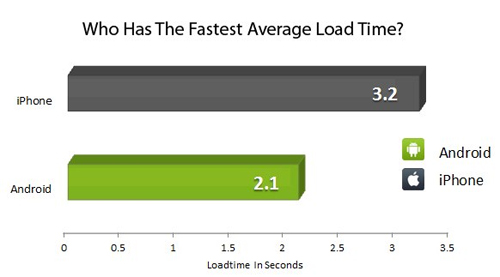Blaze调查:Android手机浏览器运行速度超过iPhone
许多人都很关注Android与iPhone这两者在手机应用程序可用性上的较量,但也有人认为,智能手机最重要的核心竞争力之一,也许并不是其手机应用的可用性或运行性能,而是浏览器的性能。
据网页优化公司Blaze最近公布的调查结果显示,在手机浏览器运行性能这一回合的PK中,Android平台最具优势。游戏邦获悉,该公司分析了4.5万个网页加载速度,发现Android手机浏览器的运行速度比iPhone快52%;
另外,Android的Chrome浏览与iPhone平台的Safari之间更是差距悬殊,前者的运行速度比后者快84%。
游戏邦获悉,在这份报告刚出炉后,业内发出了不少质疑Blaze调查结果可靠性的声音。
苹果和谷歌都将浏览器运行速度视为各自手机操作系统的竞争筹码,但Blaze的调查发现,有一些宣扬更高性能的JavaScript基准浏览器并不能反映实际的用户浏览体验。Blaze的调查衡量了全球财富100强企业网站的加载速度,主要通过Wi-Fi进行测试,连续多日数次加载这些网站,考察这些浏览器运行性能。
结果发现,Android 2.3加载时间的中间值是2.144秒,而iPhone 4.3的同一数值为3.254秒。
有趣的是,如果比较手机网页加载速度,Android仅比iPhone快3%,其加载时间的中间值为2.085秒,iPhone则是2.024秒。但如果观察非手机网页的运行情况,就会发现Android浏览器的运行速度比iPhone快了59%。据Blaze所称,“如果是在平板电脑上,Android在非手机网站上的运行优势就非常关键。平板电脑虽然也采用同样的手机操作系统和硬件,但用户希望平板电脑充分展现其自身优势,而不是在平板电脑上浏览更为简单的手机网页。Android在这一点上的优势,有助于该平台发挥更大作用。”
Blaze自己也承认,他们对这个调查结果很意外,“我们曾以为iPhone和Androind手机如果采用相似的硬件规格、相同的WebKit基础,那么它们的浏览器运行效果就是相同的;我们还以为更快速的JavaScript引擎必然产生更高效的浏览器;也曾经认为3G网速在最有利的条件下也会比WiFi更慢。”
游戏邦了解到,在这个调查结果公布之后,有人认为Blaze获取网页加载速度时所使用的定制应用程序是在UIWebView的基础上创建的,所以它们不能有效反映iOS 4.3最新版本的Safari运行情况。
苹果发言人也声明Blaze的调查“存在缺陷,他们并不能准确测试iPhone平台的Safari网页浏览器运行性能。Blaze的调查仅使用了他们自己的那种嵌入网页浏览器的应用工具,所以不能充分利用Safari网页优化功能。就算不考虑这种测试漏洞,他们也只能发现两个平台在加载网页速度上只存在一点细微差别。”
尽管遭遇多方挑战,但Blaze还是通过公司博客捍卫自己的调查结果。Blaze首席技术官Guy Podjarny虽然承认苹果发言人的声明值得他们思索,但同时也表示,“嵌入式浏览器当然可能会产生不同的调查结果,但假如苹果将他们的优化功能覆盖到所有苹果平台的嵌入式浏览器,我们当然也十分乐意重做一份新的调查报告。”(本文为游戏邦/gamerboom.com编译,转载请注明来源:游戏邦)
Android Bests iPhone at Browser Speed? Maybe Not
Much attention in the battle between Android and iPhone goes to the availability of apps on each platform. But one of the most important feature of a smartphone might not be the availability and performance of native apps but the performance of the mobile Web browser.
According to a study released today by the Web optimization company Blaze, this is a big win in the Android column. The company analyzed 45,000 page load speeds to find that Android’s browser is 52% faster the iPhones. Furthermore, Android’s Chrome browser beat iPhone’s Safari browser by loading 84% of websites faster.
Updated: Since our original publication, a number of questions have been raised about the methodology and assumptions of Blaze’s study, bringing into doubt any of the conclusions the company arrives at. See the end of the story for the technical details.
Browser speeds have been touted by Apple and Google as strengths of their respective mobile operating systems. But Blaze found that some of the JavaScript benchmarks that are referred to in order to brag about better performance really don’t reflect actual user browsing experience. The Blaze study measured how quickly “real” websites loaded, looking at Fortune 1,000 companies’ websites, loading them multiple times over different days and testing using mostly Wi-Fi.
According to the findings, Android 2.3 had a median load time of 2.144 seconds while iPhone 4.3 had a median load time of 3.254 seconds.
Interestingly, when loading mobile websites, Android was only 3% faster, with a median load time of 2.085 seconds versus iPhone’s 2.024. But on websites that aren’t optimized for mobile, Android is 59% faster. Blaze contends that, “Android’s dominance in handling non-mobile sites is especially important when considering tablets. Tablets use the same OS and similar hardware phones do. However, users expect the full experience on tablets, not the simplified mobile sites. This means Android’s edge will make an even greater impact.”
Blaze said that it was surprised by the results of its study: “We assumed that similar hardware specs and the same WebKit foundation would make iPhone and Android’s browsers perform equally. We assumed that a faster JavaScript engine equals a faster browser. We assumed that 3G would be way slower than WiFi, even under good conditions.”
You can read the full report here.
Update: Since this story was originally published, there have been several reports challenging Blaze’s methodology. Jim Dalrympe writes in The Loop that the custom apps Blaze had built to assess page-load time were using UIWebView, and as such did not benefit from the recent Safari updates in iOS 4.3.
An Apple spokesperson confirmed that the embedded Web browser does not take advantage of these optimizations. “Their testing is flawed because they didn’t actually test the Safari web browser on the iPhone. Instead they only tested their own proprietary app which uses an embedded web viewer that doesn’t take advantage of Safari’s web performance optimizations. Despite this fundamental testing flaw, they still only found an average of a second difference in loading web pages,” says Apple spokewoman, Natalie Kerris.
Since Blaze’s initial findings were refuted, the company has posted an update to its blog, attempting to clarify its findings. In a statement to CNET Blaze CTO Guy Podjarny admitted that Apple’s statement does call into question the findings of the study: “It’s certainly possible the embedded browser might produce different results. If Apple decides to apply their optimizations across their embedded browser as well, then we would be more than willing to create a new report with the new performance results.”(source:readwriteweb)









































 闽公网安备35020302001549号
闽公网安备35020302001549号